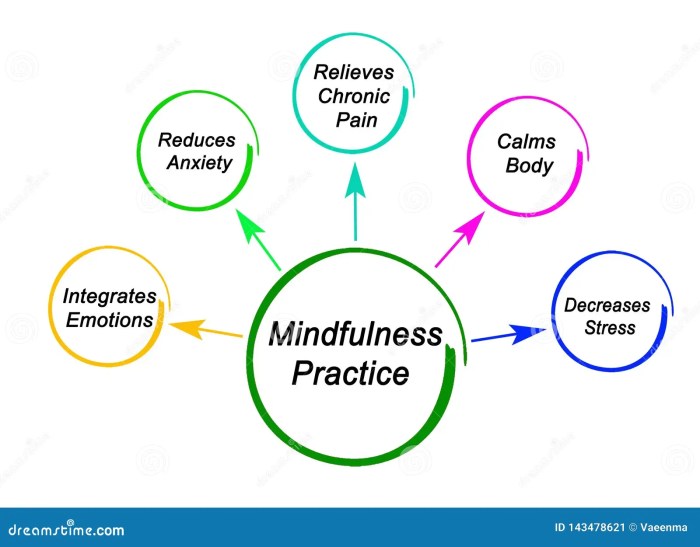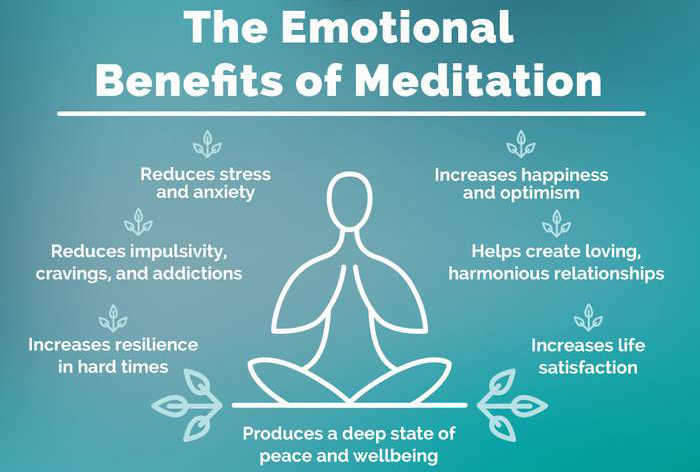10 Positive Effects of Practicing Mindfulness Meditation: Prepare to embark on a transformative exploration of the profound benefits awaiting those who embrace this ancient practice. From enhancing mental clarity to fostering emotional resilience, discover the myriad ways mindfulness meditation can enrich your life.
Mindfulness meditation is not just a passing trend but a powerful tool that has stood the test of time, offering a path to inner peace and holistic well-being.
Introduction to Mindfulness Meditation

Mindfulness meditation is a practice that involves focusing one’s attention on the present moment, without judgment or attachment to thoughts or emotions that may arise. It is rooted in ancient Buddhist traditions, dating back thousands of years, and has since been adapted and integrated into various secular contexts.
Being Present in the Moment
Being present in the moment is at the core of mindfulness meditation. It involves cultivating awareness of one’s thoughts, feelings, sensations, and surroundings in a non-reactive manner. By bringing attention to the present moment, individuals can develop a greater sense of clarity, focus, and emotional regulation.
Origins of Mindfulness Meditation Practices
The practice of mindfulness meditation can be traced back to early Buddhist teachings, particularly in the Satipatthana Sutta, which Artikels various mindfulness practices for developing insight and awareness. Over time, mindfulness meditation has been further developed and popularized in the West through the work of teachers such as Jon Kabat-Zinn, who founded the Mindfulness-Based Stress Reduction (MBSR) program.
Benefits of Mindfulness Meditation
Practicing mindfulness meditation can have numerous positive effects on both mental and physical health. Here are 10 benefits of incorporating mindfulness meditation into your daily routine:
1. Stress Reduction
Mindfulness meditation has been shown to significantly reduce stress levels by promoting relaxation and calming the mind. By focusing on the present moment, individuals can better cope with stressors and improve their overall well-being.
2. Improved Focus and Concentration
Regular practice of mindfulness meditation can enhance cognitive function, leading to improved focus, concentration, and productivity. By training the mind to stay present, individuals can better manage distractions and stay on task.
3. Emotional Regulation
Mindfulness meditation helps individuals become more aware of their emotions and how to regulate them effectively. By practicing mindfulness, individuals can develop a greater sense of emotional balance and resilience.
4. Enhanced Self-Awareness
Through mindfulness meditation, individuals can cultivate a deeper understanding of themselves and their thoughts, feelings, and behaviors. This self-awareness can lead to personal growth, improved relationships, and better decision-making.
5. Reduced Anxiety
Studies have shown that mindfulness meditation can help reduce symptoms of anxiety disorders by promoting a sense of calm and relaxation. By focusing on the present moment, individuals can alleviate anxious thoughts and feelings.
6. Better Sleep
Practicing mindfulness meditation before bed can help calm the mind and body, leading to improved sleep quality. By quieting racing thoughts and promoting relaxation, individuals can experience a more restful night’s sleep.
7. Pain Management
Mindfulness meditation has been found to be effective in managing chronic pain conditions by changing the way the brain perceives pain signals. By practicing mindfulness, individuals can reduce pain intensity and improve their quality of life.
8. Increased Resilience
Regular practice of mindfulness meditation can enhance resilience to stress and adversity. By building mental strength and emotional flexibility, individuals can better navigate life’s challenges and bounce back from setbacks.
9. Boosted Immune System
Research suggests that mindfulness meditation can strengthen the immune system by reducing inflammation and promoting overall health and well-being. By reducing stress and promoting relaxation, individuals can enhance their body’s natural defenses.
10. Enhanced Overall Well-being, 10 Positive Effects of Practicing Mindfulness Meditation
By promoting a sense of peace, clarity, and inner balance, mindfulness meditation can improve overall well-being and quality of life. By incorporating mindfulness into daily life, individuals can experience greater happiness and fulfillment.
Physical Health Benefits
Practicing mindfulness meditation can have a profound impact on our physical health, leading to numerous benefits that contribute to overall well-being.
Effects on the Immune System
- Mindfulness meditation has been shown to boost the immune system by reducing inflammation and promoting the production of antibodies that help fight off infections.
- Research has indicated that regular mindfulness practice can increase the activity of natural killer cells, which play a crucial role in immune response.
- By reducing stress and its negative effects on the body, mindfulness meditation can enhance the immune system’s ability to protect against illnesses and diseases.
Connection to Pain Management
- Mindfulness meditation has been found to be effective in managing chronic pain conditions, such as fibromyalgia, arthritis, and migraines.
- Through mindfulness practice, individuals can develop a greater awareness of their pain sensations without becoming overwhelmed by them, leading to a decrease in perceived pain intensity.
- By cultivating a non-judgmental attitude towards pain and learning to observe it with acceptance, mindfulness meditation can help individuals cope with pain more effectively.
Cognitive Benefits
Practicing mindfulness meditation not only benefits physical health but also has a positive impact on cognitive function. Let’s explore how mindfulness meditation can enhance various aspects of cognitive abilities.
Focus and Attention
- Mindfulness meditation helps individuals improve their ability to focus on the present moment without getting distracted by external factors.
- By training the mind to stay present, mindfulness meditation enhances attention span and reduces mind-wandering.
- Regular practice of mindfulness meditation can increase cognitive control, allowing individuals to concentrate better on tasks at hand.
- Research has shown that mindfulness meditation can lead to improvements in sustained attention and cognitive flexibility.
Memory Improvement
- Engaging in mindfulness meditation has been linked to enhanced working memory capacity, which is crucial for learning and problem-solving.
- By reducing stress and anxiety levels, mindfulness meditation can create a conducive environment for memory consolidation and retrieval.
- Studies suggest that mindfulness meditation can improve episodic memory, leading to better retention of past experiences and information.
- Practicing mindfulness meditation techniques like body scan and loving-kindness meditation can enhance memory recall and cognitive processing speed.
Emotional Well-being
Mindfulness meditation plays a crucial role in promoting emotional well-being by helping individuals develop a deeper understanding of their emotions, thoughts, and reactions. This practice enables individuals to cultivate a sense of inner peace and emotional balance.
Reducing Anxiety and Depression
- Mindfulness meditation has been shown to be effective in reducing symptoms of anxiety and depression. By focusing on the present moment and observing thoughts without judgment, individuals can break free from negative thought patterns that contribute to these mental health conditions.
- The practice of mindfulness meditation encourages individuals to acknowledge their feelings without getting overwhelmed by them. This awareness allows individuals to respond to their emotions in a more constructive and healthy manner, reducing the impact of anxiety and depression.
Fostering Self-awareness and Emotional Regulation
- Through mindfulness meditation, individuals learn to become more self-aware of their emotions, triggers, and patterns of behavior. This heightened awareness enables individuals to recognize and understand their emotional responses, leading to better emotional regulation.
- By practicing mindfulness meditation regularly, individuals can develop the skills needed to navigate challenging emotions and situations with greater ease. This increased emotional resilience helps individuals manage stress effectively and cultivate a greater sense of emotional well-being.
Social Benefits
Mindfulness meditation not only has positive effects on our physical and mental well-being but also offers several social benefits. By practicing mindfulness, individuals can enhance their interpersonal relationships, empathy, compassion, and communication skills.
Improved Interpersonal Relationships
- Mindfulness meditation helps individuals become more present and attentive in their interactions with others, leading to deeper connections and improved relationships.
- By cultivating awareness and empathy through mindfulness, individuals can better understand the perspectives and emotions of those around them, fostering stronger bonds.
Impact on Empathy and Compassion
- Regular practice of mindfulness meditation has been shown to increase levels of empathy and compassion towards others.
- By developing a greater sense of empathy, individuals can respond to the needs of others with kindness and understanding, strengthening their social connections.
Enhanced Communication Skills
- Mindfulness meditation helps individuals become better listeners by improving their focus and concentration during conversations.
- By being fully present in communication, individuals can respond more thoughtfully and effectively, leading to clearer and more meaningful interactions.
Workplace Benefits: 10 Positive Effects Of Practicing Mindfulness Meditation
Mindfulness meditation offers numerous advantages when practiced in the workplace setting, enhancing productivity, creativity, and stress management for employees.
Increased Productivity and Creativity
- Mindfulness meditation helps employees focus better on tasks at hand, leading to improved productivity.
- By promoting mental clarity and reducing distractions, mindfulness meditation can unlock creativity and innovative thinking among workers.
Stress Management at Work
- Practicing mindfulness meditation in the workplace can help employees deal with stress more effectively.
- By cultivating a sense of calm and relaxation, mindfulness meditation enables individuals to handle work-related pressures with greater resilience.
- Regular practice of mindfulness meditation can reduce feelings of burnout and improve overall well-being in the workplace.
Mindfulness Meditation Techniques

Mindfulness meditation encompasses a variety of techniques that aim to cultivate awareness and presence in the present moment. These techniques can be practiced individually or combined to create a personalized meditation practice.
Overview of Different Mindfulness Meditation Techniques
- Body Scan: Involves focusing on each part of the body, one at a time, to bring awareness to physical sensations and promote relaxation.
- Focused Breathing: Concentrates on the breath as it moves in and out of the body, helping to anchor attention and calm the mind.
- Loving-Kindness Meditation: Involves sending well-wishes and compassion to oneself and others, fostering feelings of love and connection.
- Walking Meditation: Focuses on the sensation of walking, bringing attention to each step taken and the movement of the body.
Comparison with Other Meditation Practices
While mindfulness meditation involves paying attention to the present moment without judgment, other meditation practices may have different focal points or goals. For example, transcendental meditation focuses on repeating a mantra to achieve a state of transcendence, while guided visualization uses mental imagery to promote relaxation and stress relief.
Incorporating Mindfulness Meditation into Daily Routines
Start by setting aside a few minutes each day to practice mindfulness meditation. Choose a quiet space where you can sit comfortably and focus on your chosen technique. Gradually increase the duration of your practice as you become more comfortable with the process.
Scientific Evidence

Mindfulness meditation has gained significant attention in the scientific community due to its numerous benefits on mental and physical health. Several studies have provided strong evidence supporting the positive effects of mindfulness meditation. These studies have shown improvements in stress reduction, emotional regulation, cognitive function, and overall well-being in individuals who regularly practice mindfulness meditation.
Neurological Effects of Mindfulness Meditation
Research has demonstrated that mindfulness meditation can lead to notable changes in the brain’s structure and function. One of the key areas affected by mindfulness meditation is the amygdala, which is responsible for processing emotions such as fear and stress. Studies have shown that regular mindfulness practice can reduce the size of the amygdala, leading to decreased reactivity to negative emotions and improved emotional regulation.Moreover, mindfulness meditation has been found to increase the volume of gray matter in brain regions associated with attention, memory, and executive function.
These changes can enhance cognitive abilities, such as focus, decision-making, and problem-solving skills. By promoting neuroplasticity, mindfulness meditation can potentially protect against age-related cognitive decline and improve overall brain health.
Long-Term Positive Changes in the Brain
The effects of mindfulness meditation on the brain are not only immediate but also long-lasting. Long-term practitioners of mindfulness meditation have shown greater connectivity between brain regions involved in self-awareness, introspection, and compassion. This enhanced connectivity can lead to improved emotional resilience, empathy, and social interactions.Furthermore, studies have suggested that mindfulness meditation can induce epigenetic changes in the brain, influencing gene expression related to stress response and inflammation.
These changes can have lasting effects on mental and physical health, promoting overall well-being and longevity.Overall, the scientific evidence supporting the benefits of mindfulness meditation on the brain is compelling, highlighting its potential to foster positive changes in neural structures and functions that contribute to overall health and well-being.
Tips for Starting Mindfulness Meditation Practice

Starting a mindfulness meditation practice can be a transformative journey towards inner peace and well-being. Here are some practical tips to help beginners kickstart their mindfulness meditation practice:
Create a Peaceful Environment
Find a quiet and comfortable space in your home where you can practice mindfulness meditation without distractions. You can create a soothing ambiance by lighting candles, burning incense, or playing soft music to enhance your meditation experience.
Start with Short Sessions
When beginning your mindfulness meditation practice, start with short sessions ranging from 5 to 10 minutes. Gradually increase the duration as you become more comfortable with the practice.
Focus on Your Breath
One of the fundamental aspects of mindfulness meditation is focusing on your breath. Pay attention to the sensation of your breath as you inhale and exhale, using it as an anchor to bring your awareness to the present moment.
Accept Your Thoughts
During meditation, it’s normal for thoughts to arise. Instead of trying to suppress them, acknowledge your thoughts without judgment and gently guide your focus back to your breath or the present moment.
Be Consistent
Consistency is key when establishing a mindfulness meditation practice. Set aside a specific time each day to meditate and make it a regular part of your routine. Over time, you’ll start to reap the benefits of consistent practice.
Join a Meditation Group
Consider joining a meditation group or class to deepen your practice and connect with like-minded individuals. Being part of a community can provide support, guidance, and motivation on your meditation journey.
Practice Self-Compassion
Be kind and patient with yourself as you navigate your mindfulness meditation practice. Cultivate self-compassion and treat yourself with the same kindness you would offer to a close friend facing challenges.
Stay Open-Minded
Approach mindfulness meditation with an open mind and a willingness to explore new experiences. Embrace the practice with curiosity and a sense of wonder, allowing yourself to grow and evolve along the way.
Use Guided Meditations
If you’re new to mindfulness meditation, consider using guided meditations to help you stay focused and relaxed during your practice. There are plenty of apps, podcasts, and online resources offering guided meditation sessions for beginners.
Persist Through Challenges
It’s natural to face challenges and obstacles in your mindfulness meditation practice. Instead of giving up when things get tough, view them as opportunities for growth and learning. Stay committed to your practice, even on difficult days.
Closing Summary

In conclusion, the practice of mindfulness meditation holds the key to unlocking a wealth of positive outcomes across various facets of life. Embrace this practice wholeheartedly, and witness the remarkable changes it can bring into your life.